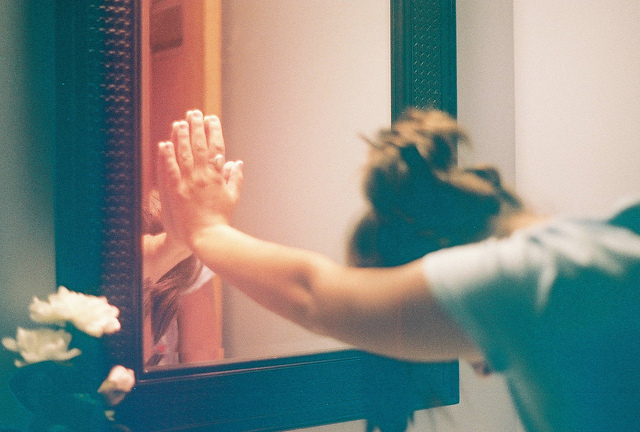There is something in a woman’s life that needs her more than anything or anyone ever will.
There is something waiting to be filled by her, that can only ever be filled by her, which holds out with a patient and loving fury and whispers, “stand in me.”
Every woman is wanted deeply, insatiably, by her own two footsteps.
I used to take pride that I was light of foot. I didn’t need to announce my presence with the weight of my gait. Until one day I found out that devaluing my footsteps could be a life-threatening habit.
I climbed snowy Volcano Pucon in Chile. It’s a popular hike for travellers, but occasionally people have slid right off that mountain. Helmets fastened and crampons buckled, the guides demonstrated what to do if we slipped on the ice: assume a face-down position and plant our ice-axe perpendicular. No more than ten minutes into trekking, the guide stopped everyone and pointed at me, demanding that I join him at the front of the group so he could keep a closer watch.
“You step too softly,” he said. “If anybody’s going to drop off this mountain, it’s you. Step like you mean it.”
Being told I’d be the first person to slide away, never to be seen again, into a white abyss because I failed to embody my footsteps made me reappraise the value of treading lightly. Who was I to walk as a faint shadow of myself?
Who was I to apologize to a world that brought me into it? Who was I to betray my existence by not letting the earth feel me?
Maybe this stepping lightly thing was not a harmless habit. My footsteps needed to feel me.
I have met many women who are adept at self-effacing.
Far too often, there’s just not enough of us in our footsteps—we tend to find crafty ways to shrink away from them:
We sign a contract with self-limitation: I will not take up space.
We make a pact against expressing our nature: My voice isn’t worth sharing.
We develop habits that sabotage our heart’s desires: I’ll keep busy and never write that book.
We accept a bargain that folds us somehow: I’ll unconsciously slave for external approval.
We apologize for our presence, even when we don’t: “I just wanted to ask…”
We play small: I got lucky. There weren’t really that many entries.
Behind our own backs, we find that we can be double-crossers, conspiring with self-rejection. Reclaiming our footsteps takes the courage to admit we’ve shied away from them. It takes acknowledging that our footsteps need us and nobody else will fill them, so we may as well have a decent go at it while we’re here.
In my women’s retreats, we explore some of the self-limiting habits we often reinforce until we’re too damn good at something that it never paid for us to get good at. I’ve never seen a woman speak about self-denial and then stand alone. One woman often speaks for the many, and there’s a power in knowing that our “habits” are not personal afflictions but collective skins we’re called to shed and outgrow. More than pain, admitting how we self-sabotage feels like courage, like coming clean.
It also creates the opportunity to choose differently.
We can re-channel the energy we didn’t realize we’ve tied up in resisting our lives back into living them. As we do, we begin to value our energies more and become more discerning. We let more of us show up, where we most ache to show up.
We can choose to practice non-doing of self-rejecting habits. What does it feel like to not over-prepare for every meeting? To not apologize for speaking up? To not think that you’re being too much? To not caveat your art before sharing it?
Does it feel more like showing up?
We can choose to make new agreements, underpinned by a belief that we’re worth our life because we’re here.
We can sign a bold contract with self-trust and self-empowerment.
We can make a brave pact to express our nature.
We can develop habits that nurture and foster our heart’s desires.
We can strike a daring bargain (with anything) that opens and nourishes us.
We can throw away our inner apologies.
We can honor the beauty of our own presence.
A woman’s footsteps are desperate for her. Every woman has a choice. She can tread too lightly to know herself, or she can take a life-affirming risk and step into life like she means it.
Author: Aimee Hansen
Editor: Renée Picard
Photo: Emily Mucha/Flickr






Read 2 comments and reply